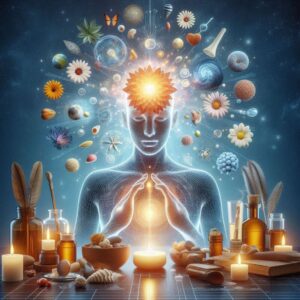Importance of Holistic Services
Understanding holistic healing is an approach to health and wellness that considers the whole person – mind, body, and spirit – in the quest for optimal health and wellness. It is a philosophy that believes in treating the individual as a whole rather than just addressing the symptoms of a specific ailment. Holistic healing considers the interconnectedness of all aspects of a person's life and seeks to address imbalances to promote overall well-being. This approach to healing recognizes that the mind, body, and spirit are all interconnected, and each plays a vital role in a person's health.
Acupuncture, herbal medicine, homoeopathy, and other complementary and alternative medical approaches are all part of integrative medicine, massage therapy, yoga, meditation, and energy healing. It is a multifaceted approach to health that considers physical symptoms and emotional and spiritual well-being. Holistic healing is based on the notion that the body has the intrinsic power to heal itself when given the proper support and environment. It emphasises the significance of lifestyle elements such as food, exercise, stress management, and emotional well-being in attaining and sustaining optimal health.
Important Things to Remember
- Holistic healing is an approach to health and wellness that considers the whole person, including mind, body, and spirit.
- Holistic healing principles include treating the root cause of illness, promoting self-healing, and focusing on prevention.
- The role of mind, body, and spirit in holistic healing emphasizes their interconnectedness and impact on overall well-being.
- Standard holistic healing practices include acupuncture, herbal medicine, yoga, meditation, and energy healing.
- The benefits of holistic healing may include reduced stress, improved physical health, enhanced mental clarity, and a greater sense of balance and harmony.
The Principles of Holistic Healing
Holistic treatment is based on the belief that the mind, body, and spirit are inextricably linked, and each plays a vital role in a person's overall health and well-being. Holistic healing acknowledges the body's underlying potential to heal itself and tries to facilitate this natural healing process through several treatments and practices. All parts of a person's life are interrelated, and it stresses the significance of treating the root of a sickness rather than just its symptoms.
Another guiding principle of holistic healing is emphasising prevention rather than treatment. Holistic practitioners aim to promote general well-being and illness prevention by treating imbalances in the body and facilitating the body's natural healing processes. This approach to health and wellness emphasises individualised care, recognising that each person is unique and may require different treatments and methods to reach optimal health.
The Role of Mind, Body, and Spirit in Holistic Healing
Holistic healing considers the mind, body, and spirit vital to a person's health and well-being. The mind is essential in holistic healing because it intensely influences the body's ability to repair itself. Meditation, mindfulness, and cognitive behavioural therapy are standard practices in holistic healing that increase mental well-being and reduce stress, which can directly impact physical health.
The body is also essential in holistic treatment since it is the physical vessel through which we experience life. Acupuncture, massage, herbal medicine, and nutrition are holistic practices that promote the body's natural healing systems. These methods are intended to correct imbalances in the body and improve general physical health.
The spirit is also seen as an essential part of holistic treatment because it involves an individual's emotional and spiritual well-being. Yoga, energy healing, and spiritual counselling are popular holistic healing practices encouraging spiritual growth and emotional well-being. Holistic practitioners think that correcting spiritual imbalances can significantly improve a person's health and well-being.
Common Holistic Healing Practices
Holistic healing encompasses a diverse range of methods and modalities. Acupuncture is a prevalent holistic healing treatment that includes inserting tiny needles into particular places on the body to improve balance and relieve pain. Herbal medicine is another popular holistic healing method that uses plants and plant extracts to help the body's natural healing processes.
Massage treatment is also frequently utilised in holistic medicine to induce relaxation, reduce stress, and relieve muscle tension. Yoga, which incorporates physical postures, breathing exercises, and meditation to enhance overall well-being, is another well-known holistic healing technique. Meditation is a popular holistic treatment technique that promotes mental clarity, reduces stress, and improves emotional well-being.
Energy healing treatments such as Reiki and Qi Gong are also widely employed in holistic medicine to help the body's energy systems be more harmonious and balanced. Nutrition is another critical aspect of holistic treatment, as it stresses the importance of healthy eating habits to enhance general well-being.
The Benefits of Holistic Healing
Incorporating holistic healing methods into your lifestyle has numerous advantages. One key advantage is that holistic medicine considers the entire person—mind, body, and spirit—to achieve optimal health and wellness. This complete approach to health can enhance general well-being and provide a stronger feeling of harmony in life.
Holistic healing emphasises prevention over treatment. It addresses imbalances and supports the body's natural healing processes, which can help avoid disease and promote general health. This approach to health and wellness also emphasises personalised care, acknowledging that each individual is unique and may require different treatments and methods to reach optimal health.
Another advantage of holistic healing is that it promotes relaxation and reduces stress, directly impacting physical health. Meditation, yoga, massage therapy, and energy healing can help relieve stress and improve mental clarity. Yoga, energy healing, and spiritual therapy are all examples of holistic healing therapies that can increase emotional well-being by resolving spiritual imbalances.
How to Incorporate Holistic Healing into Your Life
Making holistic healing a part of your daily routine may significantly improve your health. One method to incorporate holistic healing into your life is to experiment with various practices and modalities to see what works best for you. This could entail trying therapies like acupuncture, herbal medicine, massage therapy, yoga, meditation, or energy healing.
Another way to incorporate holistic treatment into your life is to adopt lifestyle modifications that promote general health and well-being. For example, you might consume various fruits, vegetables, whole grains, lean meats, and healthy fats in a balanced diet. Regular exercise is also beneficial for maintaining physical health and lowering stress. Mindfulness, meditation, or even just taking a stroll in the park can help you manage your stress, enhancing your overall health.
Seeking holistic practitioners who can give personalised care based on your specific needs can also effectively incorporate holistic therapy into your life. Finding a practitioner who connects with you through acupuncture, herbal medicine, massage therapy, alternative medicine, energy healing, or both can play a pivotal role in enhancing your health and wellness.

Finding a Holistic Healing Practitioner
When looking for a holistic health practitioner, do your homework and discover someone who speaks to you personally. One option to discover a holistic practitioner is to seek referrals from friends or family members who have had excellent experiences with holistic healing. You can also look online for practitioners in your region and read reviews from prior clients to understand their approach and philosophy.
When meeting with a possible holistic practitioner, ask about their background, training, experience, and approach to care. It is also critical to discuss your specific wants and goals with the practitioner so that they can deliver individualised care customised to your exact requirements.
It's also critical to trust your instincts when selecting a holistic practitioner. A good fit could be if you feel comfortable with the practitioner and believe they understand your needs and concerns. However, if you are uncomfortable or believe the practitioner needs to understand your needs, it may be advisable to continue searching for someone who speaks to you individually.
To recap, holistic healing is a health and wellness strategy that addresses the whole person – mind, body, and spirit – to attain optimal health and wellness. It includes a diverse set of practices and approaches that examine physical symptoms and emotional and spiritual well-being. Enhancing your overall health and wellness is possible by adopting holistic healing methods into your life and seeking practitioners who can give customised care to your needs.
If you wish to learn more about holistic treatment and try alternative therapies, read the article “The Benefits of Holistic Therapies” on the MCR Therapies website. This interesting article explores the various holistic healing methods and how they can benefit the mind and the body. You can find it on their website here.
FAQs
What is holistic healing?
Holistic healing is an approach to health and wellness that considers the whole person – body, mind, spirit, and emotions – in the quest for optimal health and wellness. It emphasizes the importance of addressing all aspects of an individual's life to achieve balance and well-being.
What are the principles of holistic healing?
Holistic healing principles include treating the whole person, promoting the body's natural healing processes, addressing the root cause of illness or imbalance, and emphasizing the importance of prevention and self-care. Holistic healing also values the connection between mind, body, and spirit and recognizes the interdependence of all living things.
What are some standard holistic healing practices?
Standard holistic healing practices include acupuncture, chiropractic care, herbal medicine, massage therapy, meditation, yoga, nutrition and dietary counselling, energy healing, and mindfulness techniques. These practices are often combined to address health and wellness's physical, mental, emotional, and spiritual aspects.
Is holistic healing the same as alternative medicine?
Holistic healing and alternative medicine are related concepts, but they are different. While alternative medicine refers to non-mainstream medical practices used in place of conventional medicine, holistic healing encompasses a broader approach to health and wellness that considers the whole person and emphasizes the interconnectedness of all aspects of life.
What are the benefits of holistic healing?
The benefits of holistic healing include improved overall health and well-being, reduced stress and anxiety, enhanced self-awareness and self-care practices, better management of chronic conditions, and a greater sense of balance and harmony in life. Holistic healing also empowers individuals to participate actively in their health and wellness.
References
What Are Holistic Drug Rehabilitation Programs? – Arrowhead Lodge Recovery. https://arrowheadlodgerecovery.com/what-are-holistic-drug-rehabilitation-programs/
The Meaning Of A Blue Aura: Calmness, Trustworthiness, And Spiritual Awareness – ourmindandbody.com. https://ourmindandbody.com/the-meaning-of-a-blue-aura-calmness-trustworthiness-and-spiritual-awareness/
The Article A Healthy Mind Body Spirit Are Essential To Holistic Recovery Was Found On https://limitsofstrategy.com

Comments are closed